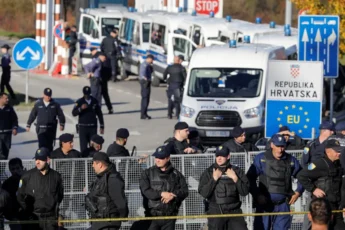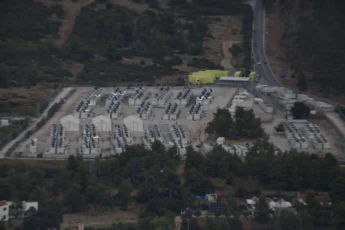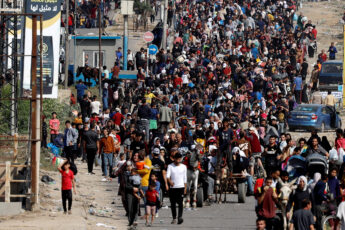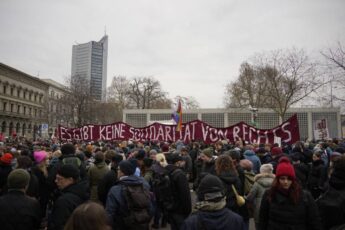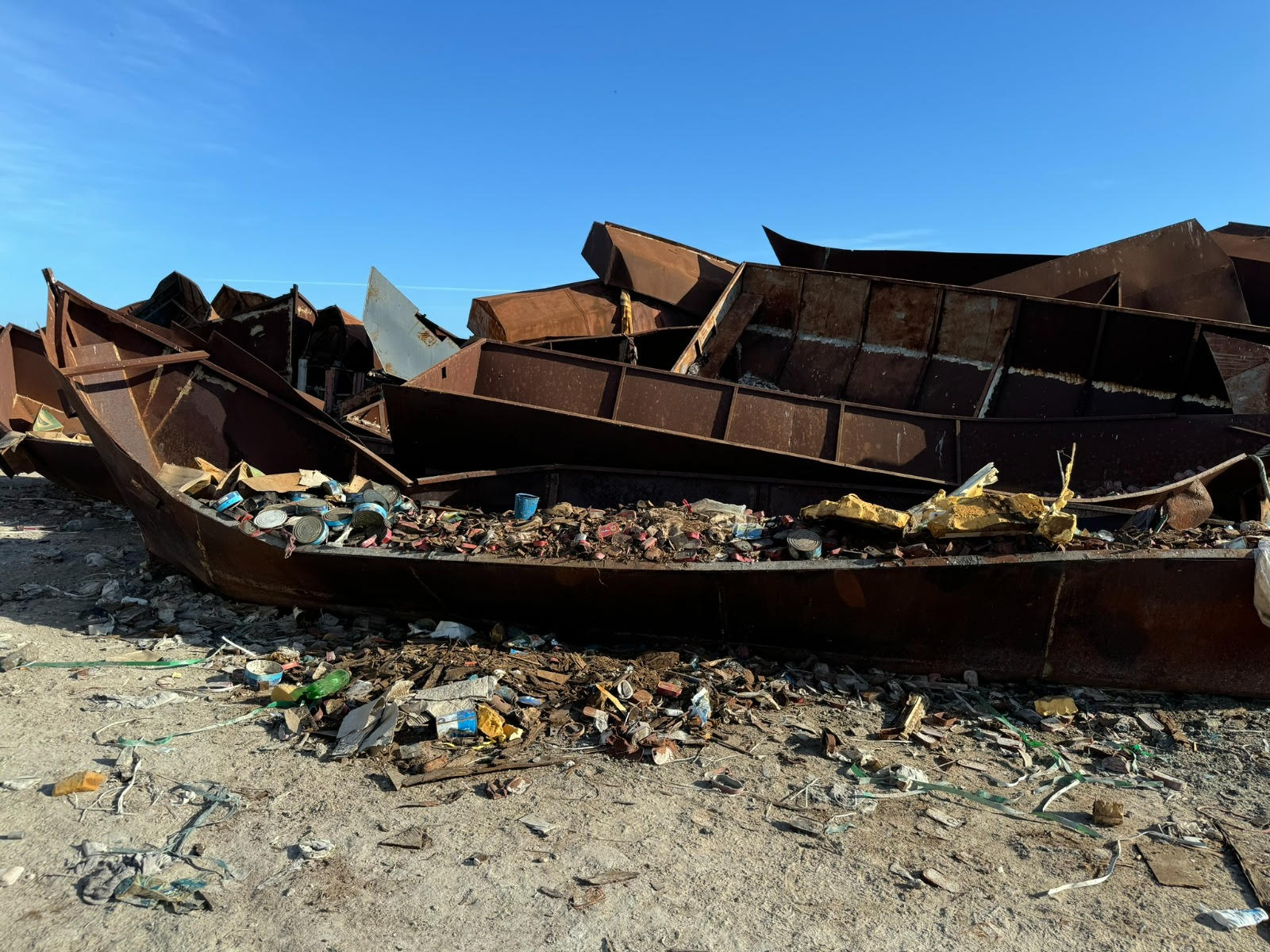
Interview with a researcher
by Giulia Magnano via connessioniprecarie.org
The situation of sub-Saharan migrants in Tunisia is increasingly marked by severe racist violence, fuelled by the economic crisis and agreements signed with European countries. The consequences of this crusade on migrants are part of a broader European strategy that increasingly reinforces racism and nationalism, and are evident even before the crossing of the Mediterranean. While actively supporting warfare, the EU seeks to shift the consequences onto migrants and strengthens border externalisation agreements, delegating the management and rejection of migrants to increasingly authoritarian governments. In November, the Tunisian Coast Guard rammed a boat carrying migrants attempting to cross the Mediterranean, resulting in the deaths of 52 people.
The Italian and European strategy is not new, and the European Commission plans to add Tunisia and Egypt (a country with which it has signed agreements following the intensification of the genocide in Gaza and the bombings in Lebanon and Jordan, in an effort to prevent migratory flows to Europe) to the list of countries considered safe. The Tunisian government’s control of migrants’ departures is becoming increasingly violent, aided by the 2023 Memorandum with the EU. Meanwhile, the progressive dismantling of democratic institutions has recently culminated in arbitrary detentions and the arrest of regime dissidents, while civilians labelled as ‘conspirators’ have been tried in military courts and sentenced to up to 66 years in prison.
The racist and nationalist policies of President Saied’s government find an easy target in the thousands of sub-Saharan women and men who arrive in Tunisia hoping to reach Europe. In this so-called ‘safe country’, the deportation of hundreds of migrants to the desert – and even their sale – are increasingly widespread practices, encouraged by both the Libyan and Tunisian governments. In January, the State Trafficking report documented around 30 testimonies from sub-Saharan migrants who had been arrested and sold to Libyan officials, then detained and exploited in camps and prisons in Libya. It is not only the presence of sub-Saharan women and men, who face daily attacks from both the government and widespread racism, that is criminalised, but also the work of associations that seek to promote solidarity. Such efforts have become increasingly difficult, as those offering aid to migrants who are deemed ‘too Black’ are now viewed as threats to the state.
In this interview, a researcher working in Tunisia – who has chosen to remain anonymous due to the criminalisation of any national or international activity involving sub-Saharan migrants – discusses the current situation and how deportations and government controls are reinforcing an unprecedented assault on migrant mobility. In recent weeks, hundreds of sub-Saharan women and men, working and living in olive groves near Sfax, have protested against deportations and violence carried out by the Tunisian government. While state efforts to halt the movement of hundreds of thousands of migrants are becoming increasingly violent, it is clear that this very movement continues to reject and resist the racist hierarchies reinforced by war.
***
We have read that in recent months, controls on migrant movements have increasingly tightened and that there have also been several attacks by the Tunisian coast guard against some migrant boats. Meanwhile, Tunisia is considered by the Italian and European governments to be a safe country for the repatriation of migrant women and men. What is the current situation in Tunisia, in general, and especially concerning controls on departures?
Since President Saied’s election in 2019, Tunisia has undergone an authoritarian turn. In 2021, he froze the parliament, dismissed the prime minister, and brought the judiciary under his control – measures that coincided with tighter controls on migrants. Departures from Tunisia have risen sharply since 2021, and by 2023, the country had overtaken Libya as the principal point of embarkation for people heading to Europe. In response, the European Union – Italy in particular – has extended its border-externalisation policies to Tunisia, with serious repercussions for those attempting to leave.
Domestically, Saied deploys populist rhetoric to legitimise agreements with the EU. In February 2023, he delivered a speech accusing migrants of driving a “demographic and ethnic replacement”, echoing populist and sovereigntist narratives circulating across Europe and using them to build internal support.
The 2023 memorandum signed with the EU has channelled fresh funds to Tunisia, a country emerging from a severe economic crisis that has already had serious consequences for human rights, especially for Black migrants. Violence during maritime “pushbacks” has increased exponentially, and Black migrants are now routinely deported from Tunisia to the Libyan and Algerian borders. Many are arrested and transported there – or simply abandoned in the desert – with growing reports of people being “sold” at the Libyan border in trades between Tunisian and Libyan authorities.
Since Saied’s 2023 speech, institutional racism has further normalised xenophobic attacks on Black migrants, including by ordinary Tunisians. In informal camps and olive-grove work sites, assaults have become frequent. During my last visit, a Sudanese activist was shot dead at point-blank range by an armed Tunisian. Tunisia has become openly hostile towards Black migrants; daily life is so unsafe that many scarcely venture out except to work, fearing arrest simply for walking in the street.
The spirit of the 2011 revolution has been thoroughly overturned, and Tunisia is now a dangerous place. Freedom of expression – especially on migration – is under intense assault: Tunisian and European researchers, activists, and journalists face surveillance and arrest. In mid-October, for example, a French doctoral student researching the post-revolution trajectories of young Tunisians was detained, even though her work did not focus on migration. I think that there is a clear attempt by the authorities to ignite fear and deter acts of solidarity – and, I must say, they are succeeding.
How do you think the lives of sub-Saharan women and men have changed in concrete terms since 2023, following Saied’s speech and the finalization of the Memorandum with the EU?
Saied’s racist policies have gradually expelled sub-Saharan migrants from urban centres. Many of the sub-Saharan migrants we met now live in olive groves and the countryside, or in coastal villages near Sfax. There are more than 40,000 people camped around these villages, all waiting to leave. Obviously, they live in extremely precarious conditions, outdoors or in makeshift camps, with no humanitarian aid or support and very poor hygiene. The police have begun to enter these camps more and more often, rounding up and deporting people. Before, they were able to stay in Sfax, perhaps settling on the outskirts of Tunis, but in urban areas, being black and walking on the street exposes you to a series of dangers that are not only racist attacks but, above all, arrests, imprisonment, or even deportation.
There are specific areas where the logistics of deportation are concentrated. Migrant men and women are loaded onto buses and taken to Libya or Algeria. Deportation campaigns are not only carried out by Tunisia, but also by Morocco, Mauritania, and Algeria. In the case of Tunisia, however, there are increasing reports of people being sold to Libyans. These deportations are often not carried out in the open. Migrants are rounded up, mainly in military and inaccessible areas, safe from the prying eyes of journalists and Tunisian and international activists. These deportations take place in a situation of opacity but are almost regularised.
In the State Trafficking report we published a few months ago, we collected numerous testimonies that show how deportations are not the result of sporadic acts by a few corrupt officers of the Tunisian National Guard. They are part of a structured logistical chain involving hundreds and perhaps thousands of people who have been captured, arrested, transported to the Libyan border, and sold by people in uniform to other military personnel to fuel the economy of kidnappings and extortion within Libyan fields and lagers. With regard to these dynamics, when there is no ignorance, there is general indifference. These are processes, episodes of racism directly linked to Saied’s institutional discourse, and which are a consequence of the externalisation of borders, especially when these are reproduced within an environment linked to a history of slavery and trafficking that has historically affected North Africa. In a sense, the externalisation of borders and racism find fertile ground in the current situation, in Saied’s repression and his speeches.
What do you mean?
Populist rhetoric paints Tunisia as a country that is the victim of conspiracies, in a context where the economic crisis, inequalities, unemployment levels, and resentment towards the political class are very strong. Saied ran for elections in 2019 as an outsider to politics; he was a professor of constitutional law and did other things before that. And he won by a landslide precisely because of this, because he wanted to fight against a ruling class that was perceived as corrupt in Tunisia. In 2021, in line with this premise, he blocked the parliament using Article 80 of the 2014 constitution and declared a state of emergency. Then, starting in 2023, he promoted further legitimisation of the government through increased repression. In 2024, during the election campaign, there were only posters promoting his party, which ultimately won with 90% of the votes, even though voter turnout was very low.
Is there any form of mobilisation or organisation against this increase in repression and the criminalisation of local activist groups and international solidarity?
At the moment, there have been more than 100 arrests, so the opposition has been silenced. However, in general, few critical voices are speaking out publicly. There is strong control over the media and also over the judiciary, a real attack on freedom of expression, which is now severely restricted. In the diaspora, on the other hand, some people are publicly trying to campaign against Saied from outside the country. There are some European and international organisations. But in general, it has become very dangerous to expose oneself, criticise government policies, and try to offer a different image. It has become very difficult to talk publicly about migration; journalists do not talk about it.
Saied is trying to create a climate of deterrence to prevent Tunisia from becoming even more of a crossroads for migrants arriving from the Sahel who want to leave for Europe. So he is trying to legitimise agreements with the EU in this context. Seen from Europe, Tunisia is doing the ‘dirty work’ and blocking migrants by following the logic of externalising borders that is so dear to Europe, but internally it is very different. Internally, this discourse is framed in anti-imperialist terms. Tunisia needs EU money because of its economic situation, but internally, it has its own autonomous strategy for how to use those funds.
There have been many reports of how departures are blocked, often using violent methods; there is no legal protection, asylum applications cannot be registered, and all these things take place outside any legal framework. Morocco is currently the only country in North Africa that has a legal framework for asylum and refugee recognition, and in fact, the living conditions of sub-Saharan migrants there are much better. Tunisia, on the other hand, is becoming more and more like Libya, where the consequences of the agreements with the EU are terrible, but at the same time are praised and taken as a model.
I imagine that this situation has also increased violence that goes beyond that of the institutions and the regime…
Tunisia has become almost as hellish as Libya. There is also extensive documentation from international organisations describing Tunisia as a violent and dangerous place. Some time ago, I met a young man who lives on the outskirts of Tunis, who told me that he had been intercepted at sea because he had managed to leave the Tunisian coast for Europe. He told me that he was arrested and deported to Libya, from where he managed to escape and reach Algeria by crossing the desert for weeks. From there, he managed to return to Tunisia and now lives on the outskirts of Tunis, where he is trying to find work.
He says that finding work is not that difficult; he goes to certain meeting places where you can usually get called to work on construction sites, but it is dangerous. He goes out as little as possible because violence has increased dramatically, and he told me that he was attacked in his home by other migrants who stole the money he had saved for the journey. They often get stuck in Tunisia for months or years, and the situation has become very much like a race for survival. There is no humanitarian assistance of any kind, and even travel has become more complicated.
There is a rush to leave as soon as possible because the situation is difficult, and they often leave on small iron boats, which are cheaper and cost around 1,000 euros. Obviously, they cost less because they are much more unstable and much smaller. They are 8 or 9 metres long and 50 or 60 people are crammed into them at a time. The increase in pushbacks at sea also contributes to making departures on this type of boat even more dangerous. These boats are mainly used by sub-Saharan women and men, while Tunisians usually manage to leave in safer conditions.
There are also many layers in the mode and logistics of the journey, which follow lines of colour and economic possibilities, but in general, it has also become more difficult for Tunisians to reach Italy. In a sense, internal racism is also fuelled by the belief that the tightening of controls and pushbacks by Europe is due to the increase in departures and therefore also to the increase in sub-Saharan migrants. At the international level, these policies are also legitimised as a way to combat irregular intermediation and human traffickers, but we know very well that traffickers themselves are a product of the externalisation of borders, not the cause of this policy. Migrant women and men continue to cross the Mediterranean nonetheless. Those who sail the boats do so at greater risk, because this allows them to pay less for the journey, and in most cases, they are Tunisians themselves who organise themselves without even the intermediation of a trafficker.


